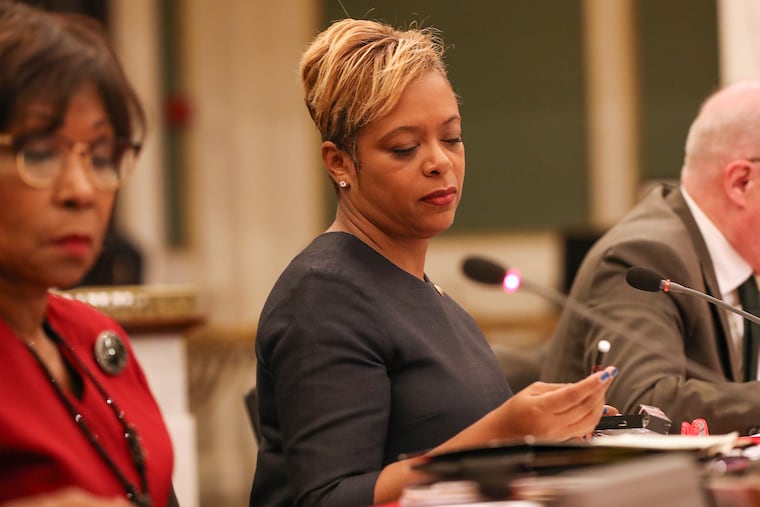A Philly City Council member wants to ban demolition in her district for six months. Some say that’s illegal.
Councilmember Cindy Bass said she wants to give residents time to process changes in her Northwest Philadelphia district.

City Councilmember Cindy Bass introduced an ordinance Thursday to ban most building demolitions for six months in her Northwest Philadelphia district, blindsiding members of the development industry and leading others to question the legality of the proposed moratorium.
Bass described her ordinance as a brake-pumping measure to give constituents time to process development-driven changes in the district.
“The goal is to create space for communities to assess proposed transformations to their neighborhoods,” Bass said in Council.
The unusual proposal comes on the heels of some heated disputes over development projects in the district and raises further questions about the use of councilmanic prerogative, the unwritten tradition that gives the city’s 10 district lawmakers near-unilateral control over land-use decisions within their realms.
» READ MORE: Neighbors — and a city councilmember — clash over latest push to revive a Germantown landmark
While demolition moratoriums in the past have targeted specific areas for building preservation, few City Hall observers could recall an instance where a lawmaker sought a districtwide ban against a key part of the construction industry.
“We were totally blindsided,” said Gary Jonas, president of the Building Industry Association of Philadelphia. “It’s super problematic and we’re really disappointed. Development is a main economic driver for the city right now, so if a whole sector of the industry shuts down, that’s a huge problem.”
Some went further and said the proposal might run afoul of state law.
Matt McClure, an attorney who leads the zoning and land-use team at Ballard Spahr, a law firm that represents property owners in development, said state courts have made it clear that cities can’t impose demolition or development moratoriums.
“This ordinance would be struck down if challenged,” McClure said. “I don’t question the motives of the legislation, but the means and use here are invalid under law.”
In a 2001 zoning case, the Pennsylvania Supreme Court noted that “the power to suspend land development has historically been viewed in this Commonwealth as a power distinct from and not incidental to any power to regulate land development.” In other words, governments can regulate development but not freeze it entirely.
Mayor Jim Kenney’s administration said it had not yet reviewed the ordinance. Jonas said the BIA would support any members who want to take legal action should the ban pass in Council.
Despite state zoning laws, City Council has approved moratoriums targeting specific areas in recent years. Last year, Councilmember Kenyatta Johnson successfully passed a one-year moratorium on razing buildings along what’s known as Black Doctors’ Row, a six-block stretch of Christian Street in South Philadelphia that was home to a prosperous Black upper-middle class in the early 20th century.
» READ MORE: Will demolition moratorium help historic preservation for Christian Street’s Doctors’ Row? City Council takes a look.
While such measures have typically been adopted in the name of historic preservation, Bass did not introduce the ban in the spirit of protecting specific landmarks.
As written, the bill would halt demolition of all properties in the 8th Council District, except in cases where either special permission is granted or the buildings pose an imminent safety threat. The moratorium would not apply to demolition projects valued under $150,000, which Bass said would avoid disrupting small renovation projects.
Jonas said he didn’t understand Bass’ rationale for the bill and received no notice before it was introduced.
“There’s a significant amount of good quality development in [the 8th District], and our members say Cindy Bass is pretty good to deal with, so this just came out of left field,” Jonas said. “Generally, we’ll hear if a councilperson is unhappy.”
Bass’ district is no stranger to tense disputes between developers and residents on projects ranging from historic redevelopments to new apartment buildings.
The bill comes on the heels of a clash over the Germantown YWCA — a long-blighted landmark that was once threatened by demolition before residents rallied to push for redevelopment. But the latest backlash wasn’t over new changes at the Y, but the lack thereof.
A development firm backed by Bass failed to secure development for the project, officials said. The building sat vacant for years, and in December, the Philadelphia Redevelopment Authority torpedoed the redevelopment agreement and went back to the drawing board to find new bidders.
The dustup pitted Bass against some constituents who said they felt ghosted by a no-show developer. Bass blamed the city contracting process and alleged racial bias toward her chosen real estate partner, the Black-owned, Ohio-based KBK Enterprises.
In a separate but related bill introduced Thursday, Bass called for hearings to examine racial bias in development, citing the low rate of city contracts that go to minority-owned development firms.
A 2020 analysis of city contracting dollars from the Office of Economic Opportunity found that 11.5% of city contracts went to African American-owned firms, and just 3.6% to Latino-owned businesses, despite those two groups representing well over half the city’s population.
“There’s something really wrong that’s happening here,” Bass said.
Jonas said membership at the Building Industry Association is eager to work with councilmembers around improving diversity in the trade. But he argued that the current demolition proposal would put a six-month stranglehold on economic opportunities for everyone.